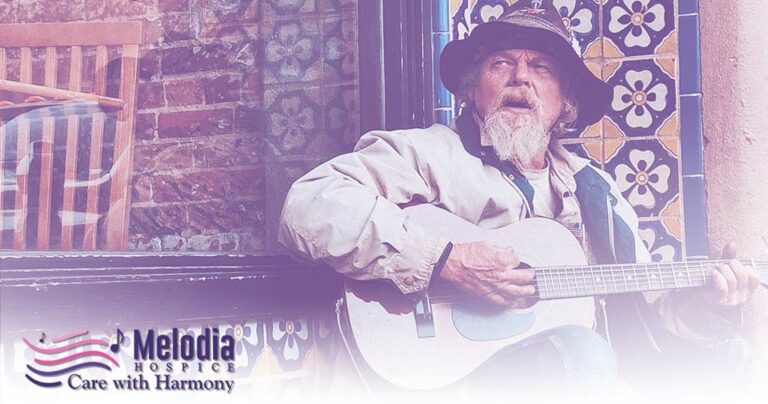Hospice Music Therapy In San Francisco East Bay, California
It may be tough to communicate with others when one is nearing the end of life. Especially when it comes to nonverbal communication, music may be an extremely effective instrument.
When it comes to providing the finest service possible, music therapists must spend time getting to know their clients and learning about their specific needs. For the first session, we’ll be playing the piano and guitar, as well as some simple percussion instruments. Anyone, regardless of musical talent, is welcome to take part in it. The participant can choose whether or not to participate in the performance by playing instruments, singing or simply sitting back and enjoying the spectacle. The first session is frequently used as a springboard for more in-depth discussions with the client about their personal difficulties, which can be addressed through music therapy.
What is Music Therapy?

Evidence-based and person-centered approaches are employed to treat a diverse spectrum of patients in the field of musical therapy. Specifically, a music therapist is educated on the limbic system of the brain and they are trained to recognize how music influences activity in the amygdala and other parts of the brain. Care plans are developed based on this information and they are tailored to the patient’s individual goals in the physical, psychological and social worlds as well as the patient’s emotional, cognitive and spiritual realms.
Melodia Care Hospice, on the other hand, is a firm believer in the therapeutic benefits that music can provide. Those working in hospices have discovered the benefits of music therapy for their patients who are nearing the end of their days. Recent research has demonstrated that musical workouts can be used to alleviate physical and emotional problems as well as improve one’s general well-being. Many hospices are investigating the possible advantages of this holistic therapy in the hopes of calming and stabilizing patients, caregivers and family members, among other things.
More than one manner, music-making and music-indulgence can benefit hospice patients in their final days. In investigations, researchers have found that the emotional healing aspects of improvisation, performances and songwriting can help patients’ overall health. This medication can have immediate mood-enhancing effects on patients, their family and caregivers when administered intravenously. Patients’ perspectives on the world and their place in it have been found to have improved as a result of this care.
Inpatients in palliative care with life-threatening illnesses arrive at the facility with a clear understanding that their lives will be drastically altered. The fact of end-of-life care is that it is a difficult notion to comprehend, conceptualize and come to terms with on a personal level. Music therapy has the potential to benefit these patients and their families in a variety of extraordinary ways. It provides comfort and relaxation while also allowing people to think on their life and memories that arise as a result of listening to music in a safe and comfortable environment. The terrible anguish and sadness that a patient or family member may experience as a result of learning the truth of an individual’s stay in a hospice facility might be excruciating for them. It enables for emotional expression, relationship reconciliation and finding closure within oneself and with others when a hospital room is transformed into a safe area for patients.
Patients and their loved ones get compassionate care at Melodia Care Hospice, with the emphasis on being cared for rather than being cured as the primary goal. The music therapy provides the opportunity for the patient to enjoy her final weeks and days by filling the antiseptic hospital room with music and making the patient smile from beginning to end. It diverts the patient’s attention away from the reason for his or her visit while allowing the patient to experience his or her overpowering feelings. One patient shared her thoughts on her participation in the music therapy program, stating that it was “the highlight of my days and weeks” and that “if I had the choice between watching some boring old re-run or listening to [music],” she says she will choose “music” every time she has the option.
Patients who receive music therapy benefit in the same way that they would benefit from medication, in that it relieves the pain associated with their sickness. In contrast to medication, music therapists hope that music, singing a meaningful song and sharing life stories will have a greater impact on a patient’s in last few days of life than medication does. When someone is listening to their favorite music and realizes that it may be the final time they will hear that particular song, they can experience intense surges of emotions that music therapists wish to assist them in embracing. The patients are able to use music to stay connected with their identities before their diagnosis and to maintain their strength while undergoing care, despite the difficult conditions.
Music As Medicine

Moreover, music therapy sessions have a good impact on the lives of persons who are no longer able to live independently in their later years.
Melodia Care, a non-profit Long-Term Care service provider for seniors and older adults, offers a variety of services.
Music Therapy Lifts Spirits With Each Note

Patients in hospice care (including those who are non-verbal) can lower their anxiety, diminish pain sensations and build lasting memories with their loved ones by utilizing the power of music.
Staff at Hospice care facilities have also expressed gratitude for the opportunity to educate patients and families about the benefits of music therapy. Music fills rooms and halls, elevating moods with each note.
The Five Pillars Of Support

When used in conjunction with hospice care, music therapy not only serves to brighten up hospital rooms and halls but it also assists with five major pillars that support a diverse collection of patients with varying levels of ability:
Music therapy can assist young people experience pleasure and creativity by providing them with opportunities to do so. Using adaptable instruments and electronic technology, in particular for individuals with physical restrictions, can aid them in the creation of musical works!
Music can be used to distract patients through difficult medical procedures or to alleviate symptoms that are persistent after treatment. It has also been demonstrated in studies that pediatric patients who listen to live music experience a reduction in pain scores, heart rates and respiratory rates.
Melodia Care Hospice, often known as music-assisted relaxation, can be used to elicit relaxation responses and to teach relaxation practices that can be used to help reduce anxiety.
When patients are with the music therapist, they have a different experience of themselves as a song-making superstar or as a kid having a good time rather than as someone who has a disability or is suffering from a life-threatening illness.
During times of grief and loss, music can serve as an unsaid conduit of connection and solace for family and loved ones as they come to terms with the reality of their situation.
All of these pillars are available to patients as well as to their families – parents, siblings and other loved ones who require and appreciate the additional comfort and care provided by the hospital. In addition to providing music therapy sessions twice a week, other safety precautions were taken towards the beginning of the epidemic.
For example, “healthy siblings who required service due to the impact of their brother or sister’s condition or illness on their lives (bereaved siblings), and patients enrolled in our program but not residing at Melodia Hospice care were provided with video sessions as needed,” according to the requirements.
Music therapy programs like the one at Melodia Care Hospice can continue to provide in-person assistance to patients and their families. However, this program, as well as others, are still required.
Music Therapy Also Benefits The Family Members

Implementing music therapy into a patient’s day-to-day life during end-of-life care can provide consolation to the patient’s family as well, as they can rest certain that their loved one is also being comforted and that they have something to look forward to during a time of sadness and loss. Patients with life-threatening illnesses who are bedridden have few options for helping them live out the remainder of their days to the maximum extent possible in order to provide a fulfilling and meaningful conclusion to their lives. The fact is, music holds a special place in everyone’s heart and research shows that it may have a transforming effect on one’s emotional and psychological state, hence boosting one’s overall quality of life even while one’s life is coming to an end.
All that everyone needs to know after losing or anticipating the loss of a loved one is assurance that their loved one will be okay, that they are loved and cared for and that they are content with the life they have had. Music therapy helps to open the door to communication between members of a family. It is designed to assist the patient’s family in dealing with their fear about the impending death of a loved one, learning how to better interact with their loved one in order to be able to share experiences and happy memories, express their thoughts and strengthening the family’s link.
Melodia Care Hospice’s music therapy program has been partially adopted, which is assisting in the re-establishment of a program that had been dormant for some time. This is a meaningful program that has the potential to make a significant difference in the end-of-life experience of patients. It is the ambition of Melodia care that, with more support for the program, music therapy will be able to assist even more patients in end-of-life care to live their last weeks or days to the fullest extent possible and offer them comfort and joy.
You can reach us at any time of day or night by contacting us through our 24/7 online customer support chat or by calling 1-888 635-6347 (MELODI-7).
